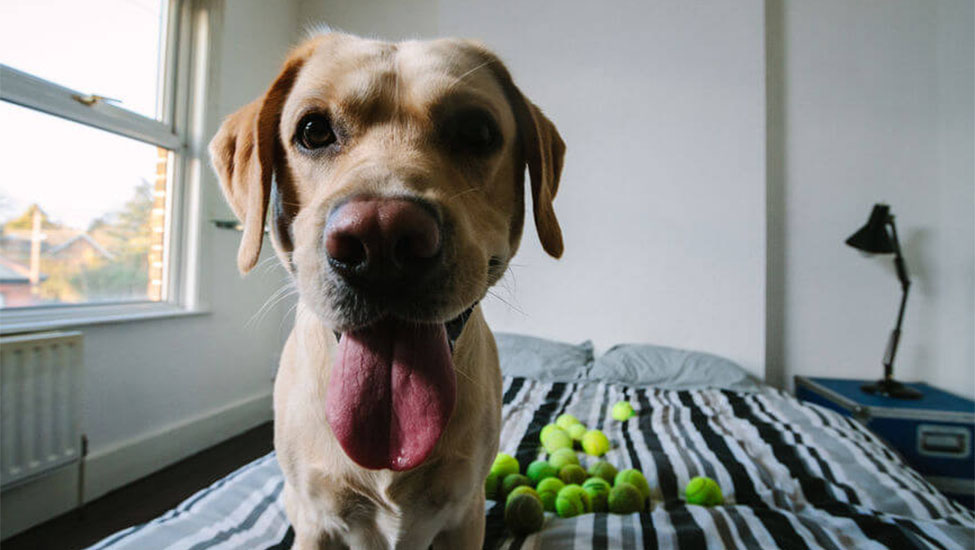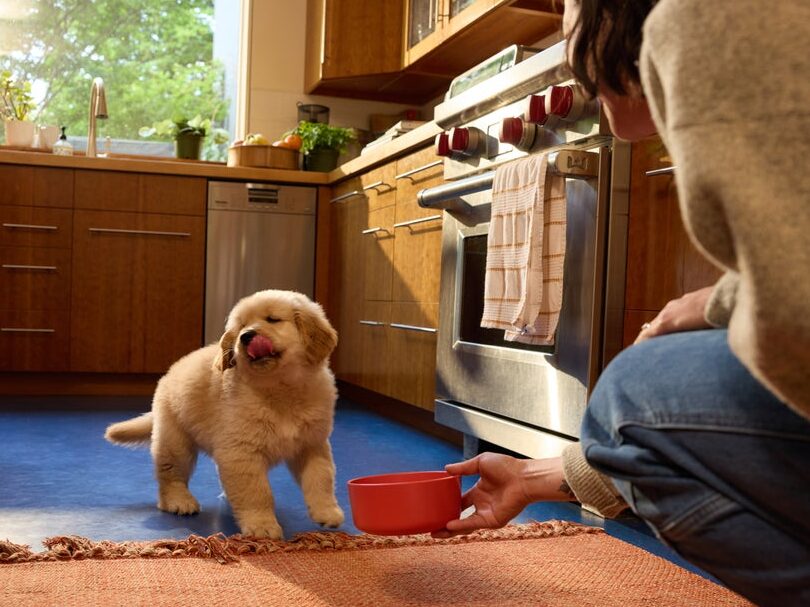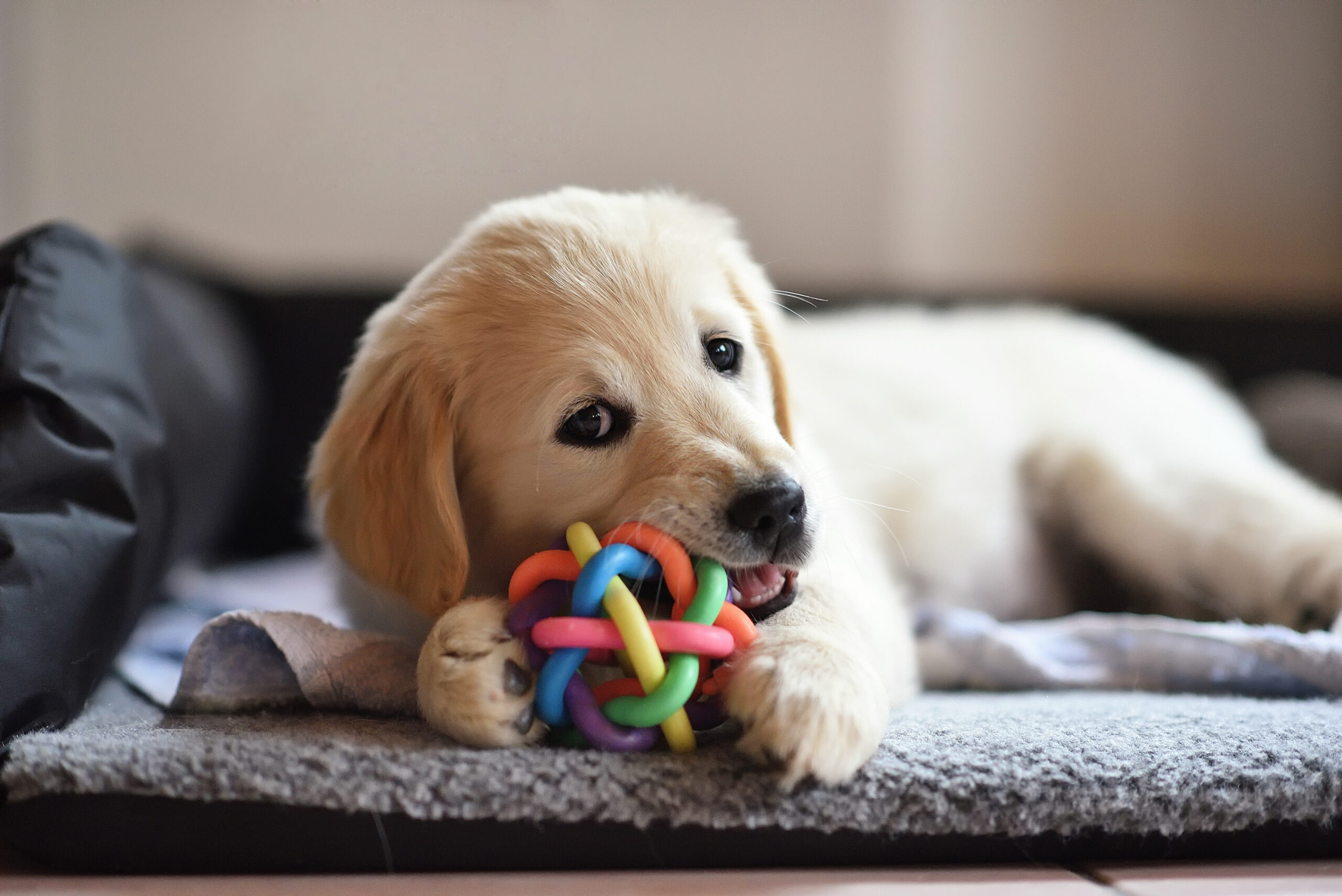Hey Ollie blog readers! We’re offering you an exclusive 60% OFF your starter box! Try now!
A few months ago, I came home from work to find my boyfriend, Wes, on his hands and knees in the bedroom scrubbing our king-size comforter, which was splayed out on the floor. I was about to ask what happened when I saw the bottle of Nature’s Miracle in his hand.
“Seriously??” I said. “He peed on the bed?”
“Yep,” Wes replied. He shook his head dejectedly, without even looking up at me. Oliver, our six-year-old Wheaten Terrier, had been known to have accidents in the house but he’d never peed the bed (at least that I knew of; Wes had Oliver for four years before we met).
“What happened?” I asked, the anger rising in my chest.
“I don’t know,” Wes said. “I came home, let him out of the crate, and went into the kitchen to start dinner. After a few minutes, I noticed it was a little too quiet so I poked my head out to see what he was doing, and he was on the bed peeing.”
“You mean he literally stood on our bed…lifted his leg…and peed?” I asked, drawing out the series of events as dramatically as possible.
“Yep,” Wes said evenly. He was being calm, his default mode when he can see my head is about to explode.
This wasn’t the first time Oliver’s behavior had sent me into a blinding rage: last year, he broke into the trash can when we weren’t home and dragged garbage (I’m talking coffee grinds, eggshells, meat and veggie scraps, you name it) all over the dining room. He’s chewed up numerous cherished items including sandals, headphones, bras, and underwear. And he regularly uses the apartment as a toilet. Just that morning I’d found several poop pellets and a pile of pee in his “spot” in the dining room.
After months of my complaining about Oliver to my therapist, she threw her hands up one day and said: “Enough! Oliver is a defiant dog, and that’s all there is to it. He doesn’t respect you, and he deliberately disobeys you.”
Like a mother who realizes she’s not crazy—her child really HAS been flushing his vegetables down the toilet to avoid eating them—a wave of validation washed over me. That’s it! I thought. He’s defiant. He KNOWS he shouldn’t pee in the house, let alone ON OUR BED and he does it anyway. It’s his way of saying: “Eff you, I do what I want.”
Drunk with the satisfaction of a detective who’s finally solved a murder mystery (and blind to the fact that it’s kind of weird to psychoanalyze your dog), I told Wes my therapist’s diagnosis: Oliver is a defiant dog, plain and simple.
“Nah, I don’t think so,” he said. “He loves us. He’s not trying to defy us.”
Determined to prove Wes wrong (and find out how to deal with Oliver’s OBVIOUS defiance), I called Robert Haussman, founder and lead trainer of DogBoy NYC. He listened patiently to my “proof” and said:
“The first thing we need to do is remove the label ‘defiant.’” My heart sank. “We have a tendency to apply human thoughts and emotions to dogs—everything from calling them defiant to saying they love us—but that’s not a concrete way of understanding their behavior. It’s not that dogs don’t have feelings—they definitely do. They are living creatures who are driven by their needs. The problem is a lot of times those needs don’t meet up with ours.”
Case in point: When Wes came home from work, his need was hunger so he went to the kitchen to make dinner. Oliver’s need was that, after being crated for several hours, he had to go to the bathroom. Wes didn’t take him out as soon as he came home, so Oliver sniffed around the apartment until he found a desirable place to relieve himself.
“Peeing on the bed is actually a pretty common behavior issue,” says Haussman. “If a dog is stressed—for example, Oliver could be stressed out by your absence all day—he will seek out the smell of his people and urinate on it. He’s putting his scent around your house just like he does outside when he pees on a lamppost.”
This made sense to me—though it, unfortunately, debunked my groundbreaking theory that Oliver’s behavior was his way of saying “eff you” to Wes and me.
“Think about the way dogs use urine,” Haussman explains. “They don’t use it as a fuck you to anything. They use it as communication.”
So then what is Oliver trying to communicate? Most likely that he’s not getting his needs met, says Haussman. It could be that we’re leaving him in the crate for too long or that his daily walks with the dog walker aren’t long enough (Wheaten terriers are known for having a ton of energy, after all). Or perhaps he’s lonely and his actions are a cry for attention. Wheaten Terriers are also known for being people-oriented dogs who are unhappy when away from their families.
The thought of Oliver not having his needs met made me feel like a terrible pet parent. “What should we do?” I asked Haussman. To correct his peeing and pooping problem, Haussman says you have to ask the following: What’s triggering the behavior? What does the behavior look like? And what’s the consequence for the behavior?
When Oliver goes to the bathroom in the house, there’s usually no consequence. We rarely catch him in the act; usually, one of us discovers the “present” later and all we can do is clean it up (Wes’s dad is fond of saying we should buy stock in Nature’s Miracle). “There’s no point in disciplining him after the fact,” agrees Haussman. “He won’t be able to connect the dots between his behavior and the punishment.”
A better idea, he says, is to a) put Oliver on a more regular schedule and b) use positive reinforcement every time he relieves himself outside.
“A regular routine is really important for dogs,” says Haussman. “If you normally take Oliver out as soon as you get home from work and then one day, Wes gets home first and doesn’t let him out, then, of course, he’s going to pee.”
If there’s one thing Wes and I are guilty of it’s not keeping Oliver on a consistent schedule. We don’t feed him or take him out at regular times each day so it’s no wonder he relieves himself whenever he feels like it—he can’t depend on us to take him out when he needs to go (again, terrible pet parent guilt!). Haussman says to start giving him food and water at the same time each day. “That way you know how long it takes to go in one end of the conveyor belt and out the other,” he notes. In other words, we can come to expect when Oliver has to go and make sure we get him outside in time.
Haussman also suggests rewarding him for peeing and pooping outside, which will give him incentive to hold it and not relieve himself indoors. “That’s how you change a habit,” he explains. “You make it undesirable to perform the behavior indoors and really positive and rewarding to perform the behavior outdoors.”
When it comes to Oliver’s other annoying behaviors (the chewing, the barking, the leash-pulling), Haussman says it’s likely a matter of getting his energy out. “Wheatens are hyper excited animals, and when you have a highly aroused dog, you’re going to have more excited and perhaps misplaced behavior.” To tire our Energizer bunny out, Wes and I started taking Oliver to daycare twice a week, and sure enough, his behavior improved. He’s so exhausted when he gets home that he’s too tired to make mischief around the apartment.
Talking to Haussman made me realize: Oliver isn’t defiant (or mean or resentful or any number of other human emotions I could label him with). He’s a dog. A wonderfully simple creature who needs only a few things to be happy: food, water, bathroom breaks, exercise, love, attention, and plenty of belly rubs. Now I know that when he behaves badly, he’s not being defiant. He’s communicating what he needs—whether it’s longer walks or more play time—and I’ll be there to give it to him.
The Ollie blog is devoted to helping pet parents lead healthier lives with their pups. If you want to learn more about our fresh, human-grade food, check out MyOllie.com
Tagged As:

The nutrition your dog needs,
the food they want.

Enjoying our articles? Subscribe our Newsletters and get new articles directly to your inbox
You might also like
13 May 2025
8 MINS READ
Puppy Training Guide & Behavior Timeline
Bringing home a puppy is pure magic. It’s also pure chaos—tiny teeth, zoomies, accidents in the house, and moments that make you wonder if you’re raising a future genius or a tiny tornado. …
by Ollie Pets
10 May 2025
12 MINS READ
New Puppy Checklist: Guide To Prepare For A New Dog
Bringing home a new puppy? This checklist covers everything new dog owners need—from essential supplies to training, feeding, and first vet visits.
by Ollie Pets
3 April 2025
9 MINS READ
Home Remedies for Fleas on Dogs: 10 Natural Ways That Actually Work
Wondering what kills fleas on dogs instantly and naturally? If your pup is scratching like crazy, it may be time to take action. In this guide, we’ll show you the most effective home remedies for…







